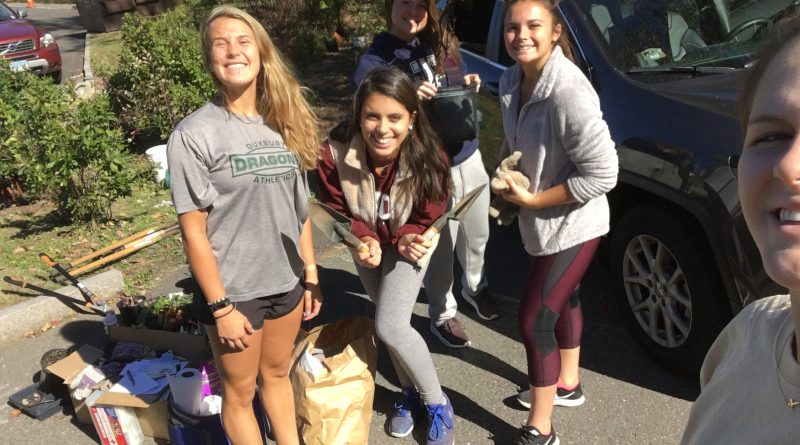Designing Community Learning: “Global Perspectives in Biodiversity and Conservation” with Professor Amber Pitt
BIOL/ENVS 141: Global Perspectives in Biodiversity and Conservation
Professor Amber Pitt, Environmental Science and Biology
Trinity College, Hartford, CT
In Professor Amber Pitt’s Fall 2017 “Global Perspectives in Biodiversity and Conservation” course, 48 students, mostly non-science majors, explored how individual choices and actions can affect biodiversity locally and across the globe. In the classroom, Pitt led students through academic study of biological diversity, analyzing current crises, consequences of biodiversity loss, and conservation practices and science to address such issues. To help her students develop a deeper understanding of local biodiversity issues, Pitt decided to implement a community learning component, pairing groups of students with community partners in the greater Hartford area to implement local conservation actions to support biodiversity.
Each group combined their research on a particular biodiversity issue in Hartford with direct action, allowing students to not only conduct localized research about why thinking about conservation matters in this area, but also see the real effects of the problem they are researching and help implement a solution. In collaboration with partners like Park Watershed, Friends of Pope Park, and Connecticut River Conservancy, these conservation projects included planting native wildflowers that support populations of pollinators such as butterflies and bees, implementing river clean-ups to reduce the amount of pollution entering local rivers and streams, establishing rain gardens to reduce stormwater runoff and improve local water quality, and removing invasive plants to restore native habitats. Students gained experience implementing conservation actions that support local and global biodiversity.
At the end of the semester, each group presented their work at a poster fair, discussing both the research they conducted and their action projects in Hartford. In “Losing Habitats, Losing Our Resources,” Gillian Reinhard ‘20, Eliza Croarkin ‘20, Zoe Billington ‘19, and Garrett Healey ‘20 described their research on how deforestation and land development can impact a forest ecosystem, pairing it with real world examples from their time working with Park Watershed to weed out invasive species and replace them with native species to help absorb runoff from a nearby parking lot.
Healey explains, “It was volunteer work, but it was also very informative because you were able to see the whole system in action and what we were learning in class outside the classroom. Mary Rickel Pelletier [of Park Watershed] had a lot of information for us and showed us what needs to be done to stop habitat degradation within CT, not just at the level of losing our charismatic species but also all the microorganisms that make up the simplest habitats.”
Across projects, students lauded the hands-on element of this course. Mhraf Worku ‘18 said this class was “by far the most hands on topic of a class that I’ve personally taken,” explaining that Pitt would “give us these theoretical frameworks but then tell us how it pertains to your life. Having had the chance to see how it plays out in real life was very helpful. This is something I can use.”
The successes of this course are based on Pitt’s leadership and organization, especially considering the large class size and number of community partners. Most community learning courses at Trinity have fairly small class sizes, so that professors can manage the additional components required of collaborating with a community partner, but Pitt wanted to make sure that all of her students had a real-world understanding of local biodiversity issues and what they can do to help. She explains, “It allows them to be engaged citizens that can do what will make their world and their lives better and happier places.”
Students in “Global Perspectives in Biodiversity and Conservation” were able to combine classroom-based learning with on-the-ground collaborative action projects to deeply understand the biological issues facing our world today and to contribute to sustaining our region’s environmental systems.
Interested in developing a Community Learning component for your course like Pitt’s “Global Perspectives on Biodiversity and Conservation”? Contact Megan Hartline at the Community Learning Initiative for opportunities, resources, and feedback about this process.


